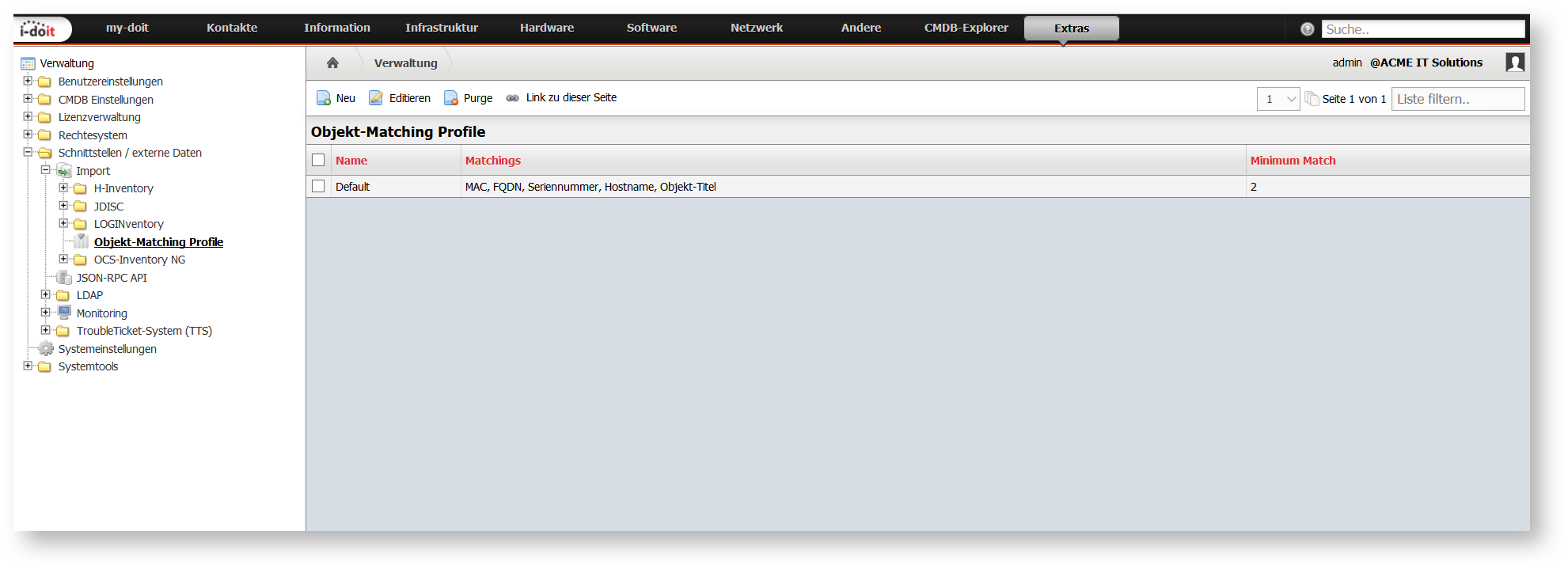Object Identification during Imports#
i-doitvides various data imports. Existing data in the IT documentation can be updated with imports instead of generating (often) unnecessary redundancy. In order to achieve this, i-doit tries to identify existing objects by means of various attributes.
Data Imports Concerned#
The following data imports are considered in this article:
Other data imports might have another way of proceeding.
Approach#
The identification of objects is carried out in two steps:
-
The unambiguous attributes of the respective data sources have the highest priority:
CSV data import: not applicable
JDisc: Device ID
OCS Inventory NG: not applicable
h-inventory: Serial numberWith the first data import, these attributes are saved and can then be used as identification feature for following data imports. If these attributes are not available, step 2 follows.
-
A so-called object matching (see below) is carried out by means of profiles.
Creation of Profiles#
Some attributes are suitable to reference objects unambiguously. You can use this characteristic regarding the data import of third-party applications with similar unambiguity. To be prepared for various import cases you can create so-called object-matching profiles in i-doit which are to be observed during import. The central configuration is under Administration → Interfaces / external data → Import → Object-matching profiles. You can create any number of profiles.
The i-doit default installation already contains a profile named Default which mustn't be edited or deleted. With the New button you can create a new profile, with Edit you can edit a profile while Purge deletes a profile irrevocably.
Several details are required per profile:
- Name: a meaningful description of the profile
- Matchings: Various attributes and other fields can be selected. With help of these attributes and fields already documented objects are searched and compared to the data to be imported. The order is irrelevant and cannot be changed.
- Minimum Match: During the matching process of data and objects to be imported in i-doit a check is carried out as to how many attributes of an object have to match. The selectable number follows the number of attributes under Matchings.
- Filter für neue Objekte (JDISC):
The New object filter option only affects NEW objects when importing JDiscs. Exclude objects from import that do not have configured attributes. Possible attributes are host name, serial number, object title, MAC and IP address. - Minimale Filterübereinstimmung (JDISC):
Minimum number of missing attributes to ignore NEW import objects.
Possible Identifiers#
| Identifier | Comments | JDisc | CSV data import | OCS Inventory NG | h-inventory |
|---|---|---|---|---|---|
| IP address | Import of network-compatible device; see category Host address | yes | yes | no | no |
| Username | Import of person; see category for Persons → Login, Username attribute | no | yes | no | no |
| Object SYSID | See category General, SYS-IDattribute | no | yes | no | no |
| IMEI number | See category Mobile ratio, IMEI attribute | no | yes | no | no |
| Serial number | See category Modell | yes | yes | yes | yes |
| Service tag | See category Modell | no | yes | no | no |
| Inventory number | See category Accounting, Inventory number attribute | no | yes | no | no |
| Location | See category Location | no | yes | no | no |
| Object type constant | Object type has to match; see custom object types | no | yes | yes | no |
| Object title | See category General, Description attribute | yes | yes | yes | yes |
| Object ID | See category General, Object ID attribute | no | yes | no | no |
| Hostname | Import of network-compatible device; see category for Host address | yes | yes | yes | yes |
| E-mail address | See category for E-mail address | no | yes | no | no |
| Room number | Import of room; see category Room | no | yes | no | no |
| Host Alias | Import of network-compatible device; see category for Host address | ja | ja | ja | ja |
| FQDN | Import of network-compatible device; see category for Host address | yes | yes | yes | yes |
| MAC | Import of network-compatible device; see category Network → Port, MAC address attribute | yes | yes | yes | yes |
| LDAP DN | When persons are synchronized via LDAP/AD, i-doit saves the corresponding DN in the background. You can't see this attribute in i-doit but you can use it as an identification | no | yes | no | no |

